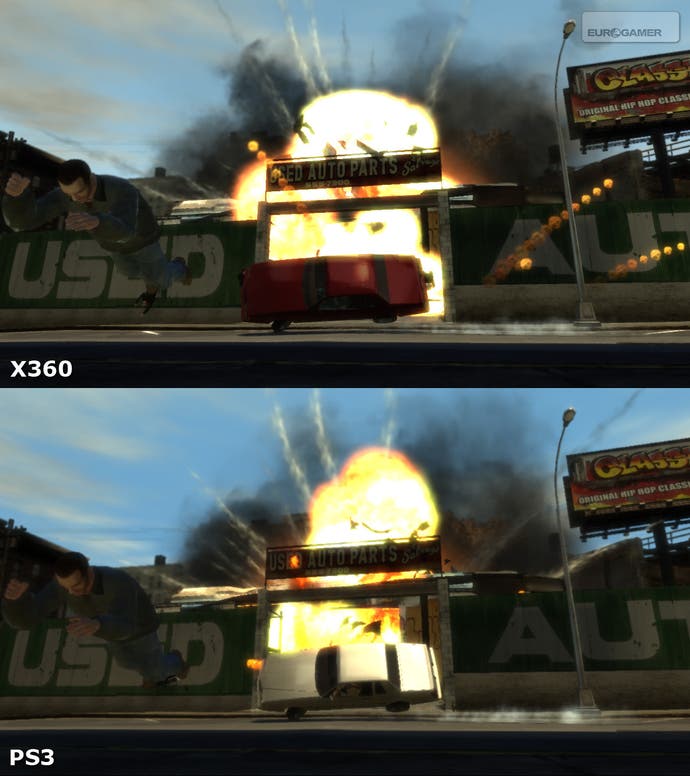Grand Theft Auto IV: PS3 vs. Xbox 360 Special
Including high-def video split down the centre.
Frame Rate Tests
So far, aside from the different visual approaches, there's not much to tell the two games apart. But the one difference I couldn't help but notice was the sense that as well as possessing a higher resolution, the Xbox 360 version of GTA IV runs noticeably smoother than the PlayStation 3 code.
What is clear is that both versions adhere to no specific frame-rate. They'll pump out as many frames as they can, roughly averaging out to around 30fps (though it can go higher). However, the amount of time any given frame will stay on-screen is variable, leading to a very inconsistent look. Compare and contrast with, say, Project Gotham Racing 4, or Criterion's Black - both examples of games with a rock solid 30fps refresh rate. In terms of GTA IV, its basic inconsistency means it's really difficult to say whether one version drops more frames than the other just by trusting your own eyes. A more scientific approach is needed.
In previous face-off features, where I've felt that it's relevant, I've always mentioned the difference in refresh rate, but now I can show you how I do it. Essentially, the basic method is simple - capture every single frame that is output over the HDMI port in a lossless format, then examine the capture to check for the amount of unique frames. Digital Foundry's coder programmed a very useful little tool that does that count for me; useful considering the first test is based on a video with over 15,000 frames.
For GTA IV, I performed six tests on a varied amount of material. All of the game's cut-scenes are based on the same engine as the gameplay, so a variety of them were chosen, both indoors and outdoors, and of varying lengths. As the cut-scenes are rendering identical scenes on the fly, it's the best test I could come up with. In all cases, the respective 3D engines will be dealing with 100 percent identical source material.
Links to compressed versions of the test material are provided, but please bear in mind that there's some pretty hardcore swearing. Oh, and possibly some spoilers.
Test One: Game Intro
360: 31.627fps
PS3: 26.504fps
See it on EGTV.
Test Two: Clean Getaway
360: 28.624fps
PS3: 23.989fps
See it on EGTV.
Test Three: Final Destination
360: 35.662fps
PS3: 29.523fps
See it on EGTV.
Test Four: Station Face-Off
360: 26.015fps
PS3: 25.803fps
See it on EGTV.
Test Five: Rigged to Blow
360: 26.507fps
PS3: 23.781fps
See it on EGTV.
Test Six: Ivan the Not So Terrible
360: 33.713fps
PS3: 28.313fps
See it on EGTV.
These figures have been updated slightly since they were originally published. Head over to the Editor's blog to find out why.
So the results clearly show that over the course of the entire clip, 360 out-performs PlayStation 3 in every one of the six scenarios presented here. Indeed, on the longer vids, with a larger average sample, we're seeing a good 17 to 18 percent variance. Tests on gameplay (playing through the same mission, but not rendering identical scenes, obviously) saw a similar range of variance too. For example, the 'Ivan the Not So Terrible' stage has a nice range of in-car, on-foot, rooftop and cut-scene action. 30.106fps average on a 360 runthrough, compared with 26.733fps and 26.696fps on two separate PS3 captures of the same mission.
The bottom line is that no matter what material I put through the detector, 360 came ahead in all tests, sometimes dramatically so.

However, it is worth bearing in mind that the frame-rate detector can only produce an average rate. By looking at the other comparison videos in this piece, you'll see that by and large the games generally run at the same speed. However, when the engine struggles to cope, the frame-rate falls and it drops harder on PS3, hence bringing down the overall average.
One curiosity I found was that the PS3 version has v-lock enabled, whereas 360 can produce the odd torn frame. This might be seen to skew results in 360's favour where it not for the fact that typically, a torn frame is only on-screen for 1/60th of a second before v-sync is re-established. More than that, closer examination of the clips reveals that the game actually swaps between two different v-lock modes, only occasionally losing sync. And when it does, in the vast majority of cases, it's a tiny effect evident only on the very top or very bottom of the screen - mostly unseen in the overscan area. More than that, our tests showed that of the entire 60fps output of the 360, the amount of torn frames averaged between 2.35 percent and 6.07 percent. In short then, really not a problem.
Therefore, it's certainly not an issue during gameplay, and regardless, the figures above are compensated anyway to give the true frame-rate. The hosted clips are from the 360 version by the way, in case you want to check.
Truth be told, it's not really the visual differences as such that gravitates me slightly towards the 360 version; it's just that the game runs more solidly on the Microsoft platform, and when the frame-rate does drop, it's not quite so jarring as it is on PS3.
And Finally...
After almost two thousands words of technical discussion, the bottom line is that it's clear that Rockstar had some issues matching the basic performance of the Xbox 360 game on the PS3 hardware. Lower resolution, zero anti-aliasing support and a more variable frame-rate are the bottom line.
On the one hand, it's a touch disappointing that Rockstar's USD 100 million budget couldn't extend to optimising the experience to match Xbox 360, especially when you look at a game like Burnout Paradise that doesn't require a mandatory installation, has a basically rock solid frame-rate, and is technically identical cross-platform.
That said, it's patently clear that Rockstar hasn't handed in a lazy conversion here. Creative decisions have been made to compensate for the technical limitations, and by and large they really work, to the point where you sometimes wonder why they couldn't have been applied to the Xbox 360 version too. PS3 GTA IV looks absolutely fantastic, and even factoring in zero anti-aliasing support and a lower resolution, in many scenarios it looks as good as the 360 version, if not better.
I've not addressed the freezing issue being reported on the game, of course. I'll have to leave that to the people affected as - try as I might to coax the code to fall over and die horribly - GTA IV behaved impeccably for me on both systems. But the chances are that by the time you read, a PS3 patch will be out and about that should sort out those who've been affected. A 360 update after that, please, complete with a tweakable option to use the PS3 post-processing modes. Now that would be interesting.








